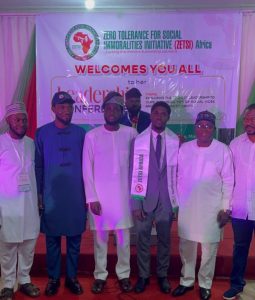

By Correspondent in Abuja.

The Zero Tolerance for Social Immoralities Initiative (ZETSI Africa) has inaugurated the pioneer executives of the Students Against Immoralities Club (SAI-Club) at its just-concluded Leadership Conference 3.0, held from August 26–28, 2025, at the University of Abuja and the National Merit House, Maitama, Abuja.
Our correspondent reports that the newly inaugurated student leaders include:Aminu Muhammed Oluwamayomikun – President,Dawood Salamatu – Vice President, Adewusi Sultan Ademola – Secretary General, and Zainab Ahmad – Director of Gender
The inauguration is widely described as a landmark in Nigeria’s student leadership and reform movement.
The Reporters gathered that conceived as a peer-led platform, the SAI-Club aims to drive moral reorientation, ethical leadership, and sustained advocacy against social vices on campuses.
Its campaigns will tackle cultism, drug abuse, sexual harassment, cybercrime, and examination malpractice, working closely with institutions such as the EFCC, NDLEA, JAMB, and the Nigerian Police Force.
Speaking at the event, Amb. Ibrahim Abdulrazak Imam, HRA, Chairperson of ZETSI Africa, calkee on the executives to embrace their new roles with a sense of higher duty:
“This is not just leadership, it is a moral responsibility. The SAI-Club is a movement of young Nigerians reclaiming their campuses and charting a new course for national development. We are confident that these pioneer leaders will set the standard for discipline, integrity, and innovation.”
The inauguration, witnessed by dignitaries, youth leaders, and over 1,000 student delegates, was one of the major highlights of the three-day conference themed: “Exploring the Tools of Leadership to Curb the Rising Tide of Social Vices Among Nigerian Students.”
ZETSI Africa acknowledged the support of partners, including the Office of the Special Assistant to the President on Student Engagement (OSAPSE), the National Association of Nigerian Students (NANS), the National Youth Council of Nigeria (NYCN), and other stakeholders, in making the initiative a success.
Edited by Dada Ahmed.

